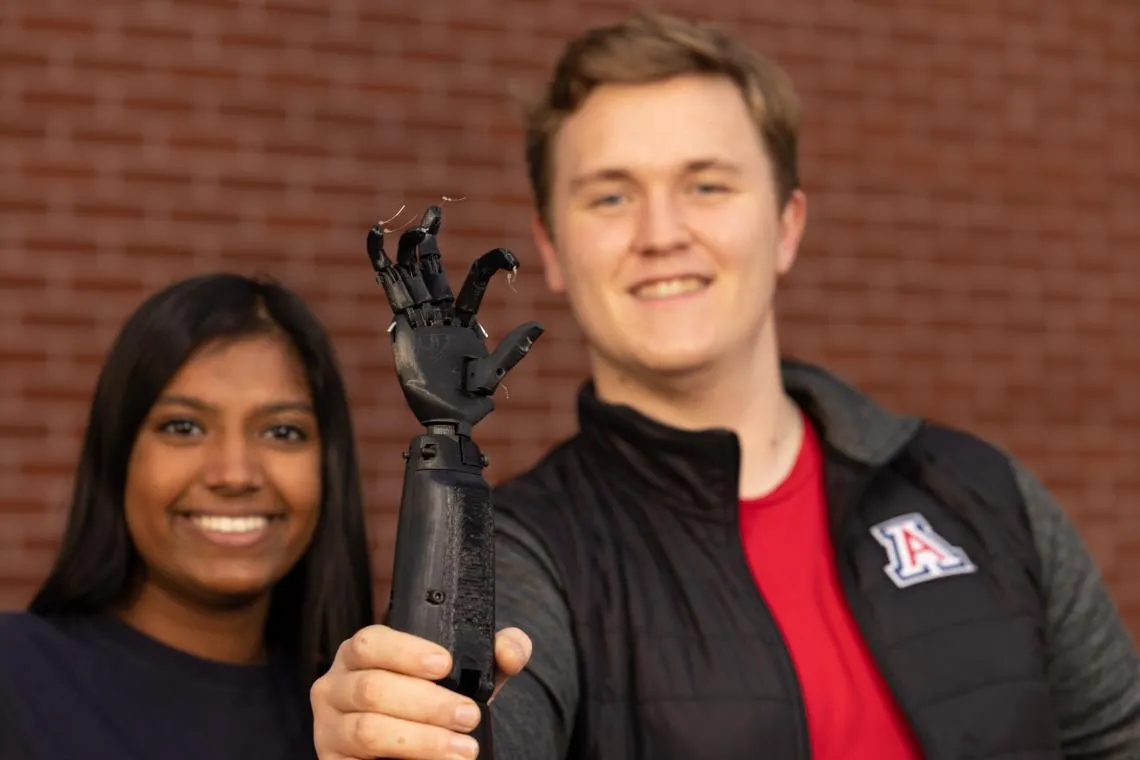W.A. FRANKE HONORS STUDENTS CREATE NEUROPROSTHETIC ARM
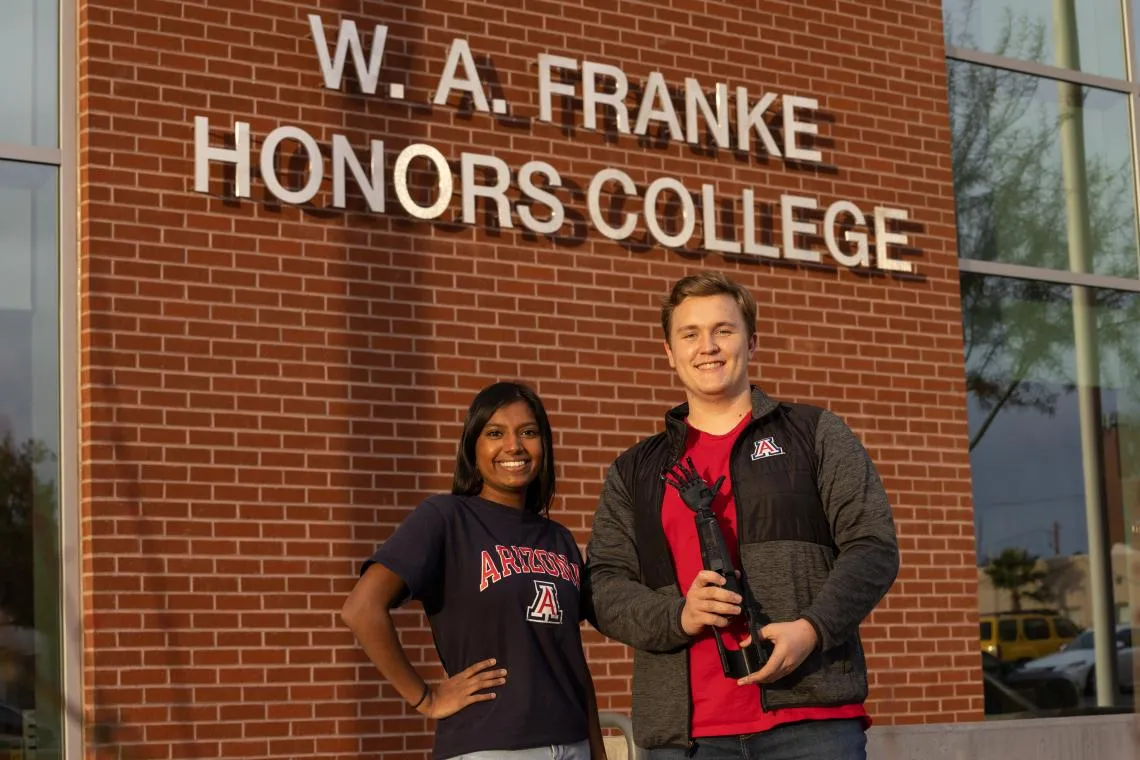
Photos by Chris Richards, Alumni Association, The University of Arizona.
Collin Preszler and Nisha Rajakrishna, biomedical engineering majors and juniors at the W.A. Franke Honors College, recently put their work into practice by creating a pediatric neuroprosthetic arm based on a design provided by the University of Michigan.
“This project had a start like I think most extracurricular or spontaneous projects do,” reflects Preszler. “I met Nisha at the beginning of sophomore year over Zoom and we quickly struck up a practice of checking and going over homework for our math class. Then she sent a text along the lines of ‘Hey, you're an electrical engineering major, too, right? What do you think about working on the circuit design and software for this project I'm starting? It's a neuroprosthetic arm!’”
From there, the two students spent the first part of spring 2021 assembling a Bill of Materials and applying for one of the development awards offered by the W.A. Franke Honors College. With the money awarded, they ordered parts and started working on the first prototype of their neuroprosthetic arm. It was an enduring, complex process. “There were lots of problems along the way with materials, production, and just getting the device to work that Collin and I have had to figure out on our own,” explains Rajakrishna. But both students are quick to credit the support of their mentor, biomedical engineering professor Nima Toosizadeh, PhD, with helping them get the project off the ground.
After several iterations of assemblies and revisions, the two undergraduates are finalizing work on their a prosthetic arm. With a prototype complete, they would like to donate their next arm to a family in need.
Describe the experience working on the arm. What are some lessons you've learned along the way?
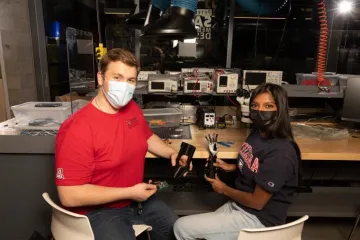
Colin and Nisha in the lab
Collin – Once we received the award, we could order parts and start to organize a space to assemble the first prototype of our neuroprosthetic arm. This was a long, complicated process, made even worse by the current, pandemic state of the world. Nevertheless, we managed to coordinate some time in the new Salter Medical Device Lab with Urs Utzinger, PhD and began to print the fingers, palm, and casings for the motors and control systems. While that was underway, I started working on the assembly of the control system, an Arduino Nano, attached to the step motors and electromyography sensors via a breakout board. The worst part of this process was that at the end of the first assembly, I had apparently shorted the Nano and so had to restart. I've been learning to be more delicate and careful with grounding myself and the table since.
I'd say the most important lessons I've learned, in no particular order, are: that some of the best opportunities will just pop up in your life and you have to be prepared to seize them when they do; that sometimes progress is blocked by factors beyond your control and you have to focus on only what you can do to proceed; more specifically to my role, that assembling circuits can be unbelievably infuriating and care must be exercised wherever possible.
How has being a W.A. Franke Honors student impacted your research and your post-graduation plans?
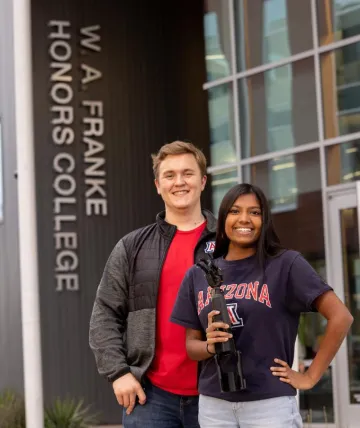
Nisha – The Franke Honors college sponsored this neuroprosthetic arm project, so none of this would have been possible without it. The Franke Honors College staff heard our idea, asked us questions about it, and then provided us with the resources we needed to be successful. Additionally, I lived in the Honors Village freshman year and met many incredible people; in fact, all of my roommates now are friends I met in the Honors Village. It was an enriching experience to live in an environment surrounded by other students who love to learn and discover. I also found my research lab through the Honors newsletter, and I have been with the SanGiovanni lab for almost two years now. We study the effect of nutrients on macular degeneration through multi-faceted research. Participating in this research for so long has shaped my interests in science and medicine and has definitely influenced my decision to apply to medical school. None of this would have been possible without the Franke Honors College!
What are some of your favorite things about living and studying in Tucson?
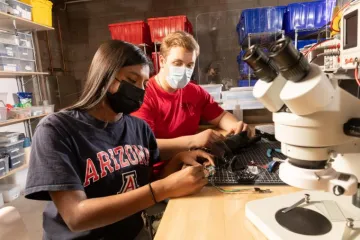
Collin – The diversity of food here in Tucson is marvelous. I've developed a few favorite places over the past two years, including Zemam's (Ethiopian), Zanya's (Mediterranean), Istanbul (Mediterranean), Sushi-ten, Raijin Ramen, The Korean Rose, and Whoops! Bakery. Some of my favorites are Mt. Lemmon, Gates Pass, and Sabino Canyon. I recently came back from a quick sunset hike at Gates Pass and managed to finish a project I'd been struggling with for days in less than an hour.
Nisha – I'm from west Michigan, so the weather in Tucson has been life-changing for me! I've spent my last 2.5 years hiking, camping, and exploring many national parks in Arizona and the surrounding states. I also love how Tucson has a small-town feel with all of the resources of a large city.
What advice do you have for first year students or students considering the W.A. Franke Honors College?
Collin – Two words: take advantage. The W.A. Franke Honors College offers so many more opportunities than early class enrollment or the Honors Village or the Honors Thesis, and people never realize that. One of the biggest complaints I've heard from people is how little they get from the College, but when I mention things like the First Year Honors Project or the Development and/or research awards, I'm met with blank faces. So, for anybody interested in the W. A. Franke Honors College, I suggest you look at every opportunity they offer, from the first year self-led research project to the numerous funding awards for development and research projects, and take advantage of those while you can.
Nisha – I think the University of Arizona already has many resources to support its students. That combined with being a Franke Honors College student at UArizona gives students endless opportunities to pursue their passions and enrich themselves. The Franke Honors College provides stipends, scholarships, professional development, special programs, and so much more to ensure their students are successful. This project is the perfect example of that. We showed them our idea, the Franke Honors College heard us out, funded us, and told us to run with it!
